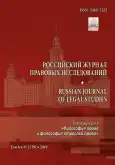Values in legal regulation
- Authors: Antonov V.F.1
-
Affiliations:
- Plekhanov Russian University of Economics
- Issue: Vol 6, No 2 (2019)
- Pages: 127-133
- Section: Articles
- URL: https://journal-vniispk.ru/2410-7522/article/view/18499
- DOI: https://doi.org/10.17816/RJLS18499
- ID: 18499
Cite item
Full Text
Abstract
The article is devoted to the axiological aspects of lawful behavior and issues of legislative consolidation of core values in the corresponding regulatory acts. As it is known in the conditions of democratic society a quite large part of legislative requirements is determined by ethical and moral instructions establishing the legality of various courses of actions in a specific situation. Experience has proven that legally valid behavior is inseparably associated with acquiring of wide range of value paradigms underlying the mechanism of legal regulation. In modern conditions law enforcement practice relies on basic moral principles of the society, providing law enforcement and required level of rule of law.
The author shows the meaning of value paradigms in different spheres of statutory regulation. Generally when developing legislative acts not only existing social and economic relations but also moral dimensions of social life are considered. In such cases in the course of normative legal acts interpretation law enforcement authorities cater to the corresponding ethical and moral norms specifying regulatory prescriptions. It is mentioned in the article that social ideals, historical and cultural traditions, dominant within collective consciousness are included in the structure of public morality.
Any legal system makes an assumption that there is a system of core values reflecting peculiarities of national culture and existing system of moral regulations. Upon traditional values the system of moral and ethical judgments defining the corresponding regulatory acts is formed. It is customary to understand by public morality a quite extensive complex of communicative relations forming in view of value paradigms depending on existing historical and cultural traditions of specific society. In the democratic society the justice is fulfilled in the light of declared ideals and values providing settlement to local conflicts in different spheres of statutory regulation.
Keywords
Full Text
##article.viewOnOriginalSite##About the authors
Vladislav F. Antonov
Plekhanov Russian University of Economics
Author for correspondence.
Email: 5592606@bk.ru
PhD in Law, Associate Professor of the Department of the State Legal and Criminal Law Disciplines
Russian Federation, MoscowReferences
- Венгеров А. Б. Теория государства и права: Учебник для юридических вузов. М., 2000.
- Гегель Г. В. Ф. Философия права. Пер. с нем. / Ред. и сост. Д. А. Керимов и В. С. Нерсесянц. М., 1990.
- Карпец И. И., Ратинов А. Р. Правосознание и причины преступности // Советское государство и право. 1968. № 12.
- Керимов Д. А. Методология права. Предмет, функции, проблемы философии права. 3-е изд., перераб. и доп. М., 2003.
- Коркунов Н. М. Лекции по общей теории права. М., 1904.
- Косенко С. И. «Мягкое могущество» в твердой упаковке. Особенности культурной политики Франции. М., 2011.
- Криминология: учебное пособие / Под ред. Н. Ф. Кузнецовой. М., 2007.
- Радько Т. Н. Теория государства и права: Учебник для вузов. М., 2005.
- Узнадзе Д. Н. Экспериментальные основы психологии установки. Тбилиси, 1961.
- Шестаков В. П. США: Псевдокультура или завтрашний день Европы? Ридерз дайджест по американской культуре. М., 2012.
- Щенникова Л.В Добрые нравы как категория гражданского права // Нотариальный вестник. 2012. № 3.
- Щербакова Н. В. Правовая установка и социальная активность личности. М., 1986.
Supplementary files







